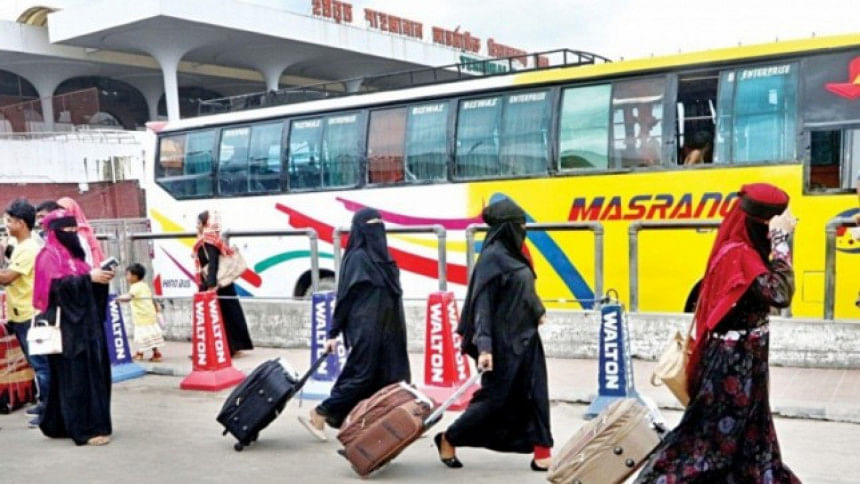BRAC report on migrant workers: Abused, 67,199 women returned in 6 years

- 49,924 women (the highest number) sent back in 2020
- Since 1991, over 1.2 million women migrated abroad
- Saudi Arabia top destination for female migrant workers
More than 4.7 lakh Bangladeshi migrant workers have returned home over the past six years after facing various forms of abuse, exploitation, and hardship, according to a BRAC report.
Of them, 67,199 are women who faced sexual and physical abuse, according to the report "Together We All: Protecting Rights and Empowering Women Migrants" presented at an event yesterday.
The report says 49,924 women were sent back in 2020 -- the highest number ever recorded.
Since 1991, over 1.2 million Bangladeshi women have migrated abroad in pursuit of better economic opportunities, according to the report.
Saudi Arabia has been the top destination for female migrant workers, followed by Jordan, the UAE, Lebanon, Qatar, Mauritius, Kuwait, the UK and Malaysia.
Several push factors compel Bangladeshi women to seek employment overseas, including social and economic vulnerability, poverty, unemployment, lack of quality education and skills and even environmental pressures.
However, life abroad often proves harsher than expected. The report paints a grim picture of exploitation, ranging from trafficking and forced labour to gender-based violence.
Many women arrive at their destinations only to discover that promised wages are withheld, working conditions are abusive, and language and cultural barriers make it difficult to seek help.
Most female migrants are unskilled or semi-skilled, leaving them even more susceptible to mistreatment. Isolation is further compounded by restrictions on mobility and communication with their families, the report said.
The ordeal does not end upon return. Many women come back with serious physical injuries, illnesses and deep psychological trauma. At the airport, they often lack food, medical attention or even someone to receive them, the report added.
Once back in their communities, they face mental health challenges such as trauma, depression and social isolation.
Financially, they are often burdened with debt, have limited access to financial services and lack ownership of their earnings or savings.
"Many returnees are socially stigmatised and face immense difficulty finding employment -- this makes reintegration into society a long and painful process," said Shariful Hasan, programme head of BRAC Migration, while presenting the findings of the report at an event yesterday.
Two female migrant workers -- Rojina and Selina -- who returned home after facing abuse shared their harrowing experiences at the event.
"I was forced to return from Jordan after falling ill. My illness was caused by mental stress due to overwork and a lack of nutritious food. Besides, I was not given the job I was promised," Rojina said.
Selina also faced exploitation and abuse.
Speaking at the event, Shaheen Anam, executive director of the Manusher Jonno Foundation, questioned the rationale behind sending unskilled female workers abroad.
"Why do we send unskilled female workers who have no capacity to bargain? We need policies to ensure that no unskilled migrant workers are sent abroad."
She also called for a national strategy to provide psychosocial support, skill development and community reintegration for returnee female migrants.
Shaheen urged policymakers, civil society and international partners to collaborate in addressing the structural vulnerabilities faced by Bangladeshi women throughout the migration process.
Meanwhile, Mushfiqur Rahman, chairperson of SME Foundation, stressed the importance of training and workshops to improve the financial literacy of female migrant workers.
He also called for policy support to resolve the issues confronting them.
The crisis surrounding female migration is preventable if the country adopts gender-responsive migration policies, said Sheepa Hafiza, chairperson of Migration, Inclusion & Justice Activist.

 For all latest news, follow The Daily Star's Google News channel.
For all latest news, follow The Daily Star's Google News channel. 



Comments